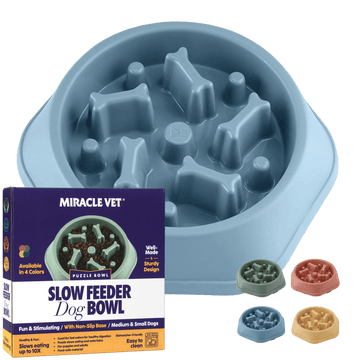At Miracle Vet, we look at the different types of allergies affecting dogs, how to identify these and ways to treat them.
Allergies in dogs are a common problem and can be caused by a variety of factors, including food, environmental allergens, and flea bites. Allergies can cause your dog a lot of discomfort and can affect their behavior as well as general health.
Identifying and treating your dog for an allergic reaction can be difficult but being able to eliminate various antigens can help your pup be happier and healthier.
Types of Dog Allergies
Allergies in dogs are a common health problem in the United States, affecting millions of dogs each year. Some of the most common types of allergies in dogs include:
- Food Allergies: Food allergies are caused by certain ingredients in a dog's diet, such as beef, chicken, dairy, wheat, and soy. These allergies can cause digestive problems, skin rashes, and itching.
- Environmental Allergies: These are allergies caused by environmental factors such as pollen, dust, and mold. They can cause itching, skin rashes, and respiratory problems in dogs.
- Flea Allergies: Flea bites can cause an allergic reaction in some dogs, leading to skin irritation, itching, and hair loss.
- Contact Allergies: Contact allergies are caused by substances that come into contact with a dog's skin, such as certain types of shampoo, carpet cleaners, or bedding materials. They can cause skin irritation, redness, and itching.
Symptoms Your Dog Has An Allergy
There are some tell signs that your dog has had a reaction to an antigen.
- Itchy skin: Dogs with allergies often have itchy skin, which can lead to excessive scratching, licking, and biting at the affected area.
- Redness and inflammation: Allergies can cause redness, inflammation, and irritation of the skin, ears, and eyes.
- Sneezing and coughing: Dogs with allergies may also exhibit symptoms similar to those in humans, including sneezing, coughing, and runny nose.
- Digestive issues: Some dogs with allergies may experience digestive issues such as diarrhea, vomiting, and loss of appetite.
- Changes in behavior: Dogs with allergies may become more irritable, restless, and uncomfortable.
These symptoms on their own or together may be a sign your dog has an allergy, however they may also be a symptom of something else, so finding out if it is an allergy is very important to rule out any other medical issues or underlying conditions.
The symptoms you see are an immune response to an antigen, whether it is food or environment, or those pesky ticks your dog's reaction may vary depending on their immune system and response triggers.
Treatments For Dogs With Allergies:
- Identify and eliminate the allergen: The first step in treating allergies in dogs is to identify and eliminate the allergen if possible. This may involve changing the dog's diet, using hypoallergenic products, or avoiding certain environmental triggers.
- Medications: There are several medications available that can help alleviate allergy symptoms in dogs. These include antihistamines, corticosteroids, and immune-modulating drugs. It is important to consult with a veterinarian before giving any medication to your dog.
- Allergy shots: Allergy shots, also known as immunotherapy, may be recommended for dogs with severe allergies. This involves regular injections of the allergen over time to help the dog build up immunity to the allergen.
- Topical treatments: Topical treatments such as medicated shampoos, sprays, and creams can be used to relieve symptoms and soothe the skin.
- Prevention: Regular flea and tick prevention can help prevent flea allergy dermatitis, and keeping the dog's environment clean and free of allergens can help prevent other types of allergies.
As your dog's reaction is an immune response, keeping their immunity high and their overall immune system healthy can reduce the reaction, minimizing symptoms and discomfort.
You can help boost their immune system and help block allergic reactions with our Allergy Blocking and Immune Boost Chews.
It's important to remember that allergies in dogs can be a lifelong problem, and there is no cure for allergies. However, with the right treatment and management, dogs with allergies can live happy and comfortable lives.
For more advice on keeping your dog healthy sign up to our newsletter.










